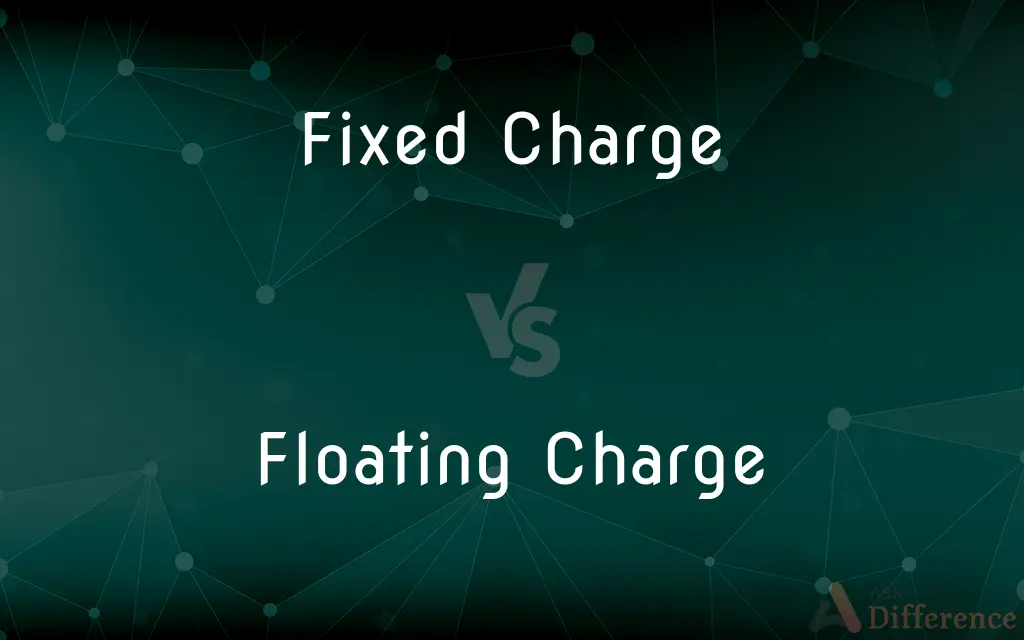Fixed Charge vs. Floating Charge — What's the Difference?
By Tayyaba Rehman — Published on October 29, 2023
Fixed Charge is a specific, predetermined claim on a particular asset or set of assets. Floating Charge is a claim on a changing pool of assets, typically the whole of a company's assets, subject to change in nature and value.

Difference Between Fixed Charge and Floating Charge
Table of Contents
ADVERTISEMENT
Key Differences
A fixed charge is a specific, predetermined claim that is secured against a particular asset or a defined set of assets. A floating charge, on the other hand, is a claim on a changing pool of assets, often the entire asset base of a company.
It grants the lender a priority claim on those assets in the event of default. The nature and value of the assets remain constant and identifiable. The assets subject to a floating charge can fluctuate in nature and value over time. Creditors with floating charges have a general claim over these assets rather than specific ones.
Common examples include mortgages on real estate properties or loans secured by specific machinery. It allows a company to continue its normal operations and use assets in the ordinary course of business until a default occurs.
Comparison Chart
Nature of Claim
Specific, predetermined assets
General claim on changing assets
Asset Constancy
Assets remain constant and defined
Assets can change in nature and value
ADVERTISEMENT
Priority in Default
Priority claim on specified assets
General claim, lower priority
Examples
Mortgages, equipment loans
Debentures, overdraft facilities
Applicability
Suitable for specific asset loans
Common in business financing
Compare with Definitions
Fixed Charge
A set claim on designated property.
The fixed charge on the land secures the real estate loan.
Floating Charge
A dynamic lien on a company's entire asset pool.
The floating charge covers the company's diverse assets.
Fixed Charge
A predetermined claim on specific assets.
The fixed charge on the factory equipment ensures lender priority.
Floating Charge
A general claim on changing assets.
The floating charge allows flexibility in business operations.
Fixed Charge
A distinct lien on particular assets.
A fixed charge secures the lender's interest in the machinery.
Floating Charge
A versatile security interest in assets.
The floating charge encompasses inventory and receivables.
Fixed Charge
A secured interest in identified property.
The mortgage on the house is a classic example of a fixed charge.
Floating Charge
A claim over assets subject to change.
The floating charge adapts to the evolving business needs.
Fixed Charge
A lender's claim on specific collateral.
The fixed charge on the vehicle protects the auto loan.
Floating Charge
A fluctuating claim on the asset base.
Floating charges are common in corporate financing.
Common Curiosities
What is a fixed charge?
A fixed charge is a predetermined claim secured against specific assets.
What is the priority of a fixed charge in case of default?
Lenders with fixed charges have a priority claim on the specified assets.
What types of assets can be subject to a fixed charge?
Examples include real estate, machinery, vehicles, and identified property.
How does a fixed charge impact the borrower's use of the assets?
Borrowers typically retain the right to use the assets but with the understanding of lender's priority.
What is a floating charge?
A floating charge is a claim on a changing pool of assets, often a company's entire asset base.
How does a floating charge impact a company's operations?
It allows the company to use and manage assets in the ordinary course of business until a default occurs.
What is the priority of a floating charge in case of default?
Creditors with floating charges have a general claim and typically lower priority compared to fixed charge holders.
Where is a fixed charge commonly used?
Fixed charges are common in mortgages, equipment loans, and asset-specific financing.
What distinguishes a floating charge from a fixed charge?
A floating charge covers assets that can change in nature and value over time.
In which financial arrangements is a floating charge commonly found?
Floating charges are often associated with debentures, overdraft facilities, and corporate financing arrangements.
Share Your Discovery

Previous Comparison
Inductive Reasoning vs. Deductive Reasoning
Next Comparison
Gap vs. HiatusAuthor Spotlight
Written by
Tayyaba RehmanTayyaba Rehman is a distinguished writer, currently serving as a primary contributor to askdifference.com. As a researcher in semantics and etymology, Tayyaba's passion for the complexity of languages and their distinctions has found a perfect home on the platform. Tayyaba delves into the intricacies of language, distinguishing between commonly confused words and phrases, thereby providing clarity for readers worldwide.
















































